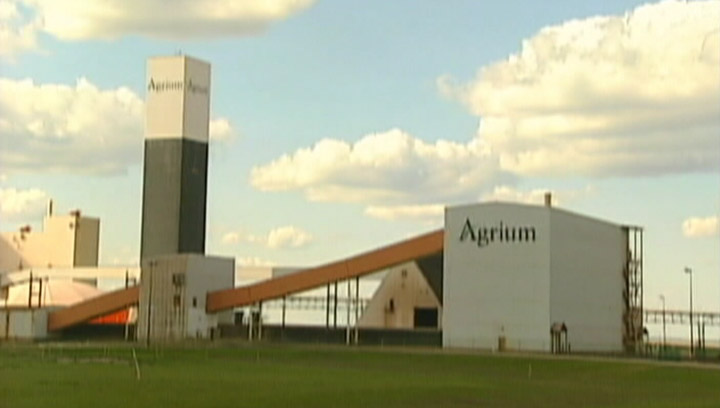CALGARY – Agrium Inc. expects demand for the crop nutrients it makes and sells to be strong in the second half of this year, the Canadian fertilizer company said Thursday as it reported a reduced second-quarter profit.

Agrium, which keeps its books in U.S. dollars, said net earnings during the quarter were $747 million, or $5.02 per share, down from $860 million, or $5.44 per share, during the same 2012 period.
Without the effects of one-time items such as share-based payments, proxy defence costs related to a battle with one of its U.S. shareholders and hedging, Agrium had $736 million of adjusted earnings, or $4.94 per share.
That trailed the average analyst estimate of $5.04 per share, according to data compiled by Thomson Reuters.
Sales were $7 billion, up from $6.8 billion a year earlier.
Agrium’s (TSX:AGU) shares – which have been under pressure because of concerns about the global price of potash – rose 2.6 per cent to $88.70 in mid-morning trading on the Toronto Stock Exchange.
Potash is one of the main ingredients used in agricultural fertilizer, which is used to promote crop growth. Agrium also produces other types of fertilizer and has a U.S. retail operation so its shares were less affected than other potash producers by fears of an international price war involving a major Russian potash company.

Get weekly money news
Agrium shares traded at the beginning of the second quarter at about C$91 but hit a 52-week low of $83.46 on Tuesday.
- Can Trump decertify aircraft? What experts say amid Bombardier threat
- Bombardier warns of ‘significant impact’ to travellers from Trump’s threat
- Corus to seek court approval of recapitalization plan after shareholder vote narrowly fails
- Canadians have billions in uncashed cheques, rebates. Are you one of them?
CEO Mike Wilson said Agrium delivered its second-best quarterly results.
“The cold, wet weather experienced in North America this spring resulted in a compressed spring application season and Agrium rose to this challenge by delivering crop input products and services to our customers in a highly efficient manner. This highlights the strength of our production and distribution assets and our ability to deliver significant value to our customers,” he said.
“We expect solid demand for crop inputs in the second half of 2013 given positive grower sentiment, strong nutrient removal this year and the affordability of crop nutrients.”
Agrium produces the three main types of fertilizer: nitrogen, phosphates and potash. It also sells crop nutrients, seeds and other products at retail centres in North America, Australia and South America.
The potash market has been in turmoil in recent weeks following Russian producer Uralkali’s decision to pull out of European cartel Belarusian Potash Company.
The breakup of the cartel was taken as a sign that Uralkali will be able to drive down the price of potash by as much as 25 per cent, affecting other rival producers in Canada and the United States.
The move could have a big impact on the economy of Saskatchewan, home to one of the world’s largest deposits of the mineral.
“It’s going to take some time to evaluate how global producers and customers are likely to respond and what the implications are for the short-to-long term,” said Agrium chief operating officer Chuck Magro.
On Wednesday, the CEO of fellow Canadian fertilizer giant Potash Corp. of Saskatchewan (TSX:POT) said the reaction to Uralkali’s move was overdone, and urged people to “take a deep breath” and “relax.”
Bill Doyle told a webcast that he expects BPC and Uralkali to mend fences sooner rather than later and that he doubts the Russian producer has the ability to single handedly drive down the price of potash.
Agrium and Potash Corp., along with U.S. company Mosaic Co., market their product abroad through Canpotex. Wilson said he doesn’t see the breakup of rival BPC having an impact on Canpotex.
Earlier this year, Agrium fended off a boardroom challenge from its largest shareholder, New York activist hedge fund Jana Partners LLC.
Jana had aimed to get five of its directors elected to Agrium’s board as a means to pressure the company into splitting up its retail and wholesale businesses, among other things.
The bitter proxy fight ended with Jana’s slate losing the vote.
On a conference call with analysts Thursday, Wilson said he had a “good meeting” with Jana representatives in June, in which the two firms discussed the fundamentals of the fertilizer industry






Comments